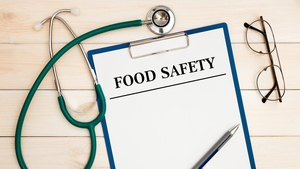A fresh feud brewing in The Golden State symbolizes the disparate treatment of myriad cannabis products in one of the world’s largest economies.
.png?width=850&auto=webp&quality=95&format=jpg&disable=upscale)
A position adopted by state officials in California has drawn criticism from companies selling cannabidiol (CBD) in conventional foods and dietary supplements.
The fresh feud brewing in The Golden State symbolizes the disparate treatment of myriad cannabis products in one of the world’s largest economies. Consumers in California can legally buy marijuana for medical and recreational use, but state officials recently said CBD products are off-limits in foods and supplements.
Relying on statements by the federal agency responsible for regulating food in interstate commerce, the Food and Drug Branch of the California Department of Public Health (CDPH) asserted in a public statement, or FAQ, “[T]he use of industrial hemp as a source of CBD to be added to food products is prohibited.”
“Until the FDA rules that industrial hemp-derived CBD oil and CBD products can be used as a food or California makes a determination that they are safe to use for human and animal consumption, CBD products are not an approved food, food ingredient, food additive or dietary supplement,” the state agency concluded.
According to CDPH’s statement, “California incorporates federal law regarding food additives, dietary use products, food labeling and good manufacturing practices for food.” The CDPH described CBD as “an unapproved food additive” that is not permitted “for use in human and animal foods per the FDA, and thus, it is not approved in California.”
Asked for this article to explain what prompted CDPH to issue the FAQ, the agency noted, “There has been some confusion on the legal use of CBD and CBD oil since the legalization of medicinal and adult-use cannabis in California.”
In 1996, California became the first state to legalize medicinal marijuana through Proposition 215. Earlier this year, the state began permitting recreational sales of cannabis after California, Massachusetts and Nevada in 2016 joined four other states in legalizing recreational marijuana.
“We will continue to work with all of our partners, including industry and local public health departments, in order to educate them on CBD and CBD oil, and to assist manufacturers as needed to assure compliance,” CDPH said in an emailed statement.
The agency said it posted the FAQ in response to questions from food processors and retailers and as part of its education effort.
Attorneys representing the hemp industry blasted the document. They contended it mischaracterized state and federal law and didn’t make any practical sense because CBD derived from industrial hemp is safe, and cannabis products—including edibles—are permitted to be sold in California.
Part of the concern has to do with simple economics: the size of California. The state is the largest market for CBD products in the country, noted Jonathan Miller, general counsel to the U.S. Hemp Roundtable, a national business organization.
“Everyone in the industry wants to be able to sell their products there, and this FAQ is a source of great concern,” said Miller, an attorney in Lexington, Kentucky with Frost Brown Todd LLC, in a phone interview.
While Miller reported hearing “mixed messages” regarding whether state officials will take any enforcement actions, he said his organization feared CDPH’s statement would cause a “chilling effect.”
In a letter to the CDPH, the U.S. Hemp Roundtable contended the agency made “inaccurate statements about the status of industrial hemp-derived CBD under the Controlled Substances Act (CSA) and the Federal, Food, Drug and Cosmetic Act (FD&C Act).”
Quoting statements from the World Health Organization, the letter stated that “the safety profile of industrial hemp-derived CBD is well-established.”
The U.S. Hemp Roundtable urged the CDPH to withdraw or revise its document, permitting the continued use of hemp-derived CBD in dietary supplements and foods in California.
CDPH is reviewing the letter from the U.S. Hemp Roundtable, but it made clear its current position on CBD in foods and beverages in California.
“CBD and CBD oil, whether sourced from industrial hemp or from cannabis, cannot be added to regular foods or beverages,” CDPH told Natural Products INSIDER. “Under U.S. Food and Drug Administration … rules, CBD and CBD oil are prohibited as food additives. California adopts FDA regulations, so CBD cannot be added to food and/or drinks in California.”
Added the agency: “CBD and CBD oil are allowable only in edible cannabis products that are produced according to the California Medicinal and Adult-Use Cannabis Regulations and Safety Act, including a source, manufacturing, distribution, testing and retail supply chain that is completely separate from regular foods and beverages. Consumers can purchase products infused with CBD from cannabis at licensed cannabis retailers.”
Bob Hoban is a Denver-based attorney, whose law firm represents clients in the hemp and marijuana industries. He asked CDPH to reconsider implementation of its FAQ and rescind it.
“For years, California has been at or near the forefront of policy reform, having first enacted hemp legislation years ago,” Hoban of Hoban Law Group wrote to the CDPH. “However, the FAQ stands to threaten an entire newly emerging industry, causing California to fall far behind the rest of the nation for years to come in its treatment and regulation of these products. Simply put, the adverse impact of this FAQ would be devastating and irreparable.”
In a Q&A and in warning letters, FDA has asserted products containing CBD cannot be sold as dietary supplements. FDA also has determined it is not legal to sell in interstate commerce food to which CBD has been added.
“This is regardless of the source of the CBD—derived from industrial hemp or cannabis,” CDPH stated.
FDA’s statements, hemp lawyers wrote to the CDPH, are neither final determinations nor supported by law. FDA has opined CBD is excluded from the definition of a dietary supplement because, in essence, the cannabis-based compound was the subject of substantial clinical investigations made public before CBD was marketed as a food or supplement.
Recently, FDA approved a CBD drug developed by GW Pharmaceuticals plc for use to treat seizures associated with two rare and severe forms of epilepsy.
The U.S. Hemp Roundtable has contested FDA’s position that the clinical investigations were “significant,” and it suggested FDA has misinterpreted the provision in the law upon which it concluded CBD can’t be sold in supplements.
What’s more, FDA’s Q&A reflects its opinion rather than having the force of law, and the agency’s requests for additional input suggest FDA’s opinion may change, the U.S. Hemp Roundtable noted in a letter signed by its president, Brian Furnish Miller and attorney Rend Al-Mondhiry of Amin Talati Upadhye LLP.
Industry lawyers also criticized CDPH’s statement, “CBD derived from hemp and cannabis is a federally-regulated controlled substance.” The statement, Hoban asserted, inappropriately defers to the Drug Enforcement Administration’s (DEA) interpretations of law and other agencies, contradicting guidance by Congress.
Certain parts of the cannabis plant, such as the mature stalks, are exempt from the definition of marijuana, lawyers pointed out. They also maintained industrial hemp is legal under California law and Section 7606 of the federal Agricultural Act of 2014 (otherwise known as the farm bill).
“It would, in fact, be a perverse interpretation of the farm bill for ‘industrial hemp’ to be made lawful, but that the crop must then be destroyed because it contains alleged controlled substances,” Hoban wrote to the CDPH.
Miller didn’t know if anyone had stopped selling CBD-containing foods or supplements in California, but he said he wouldn’t be surprised if, for example, products have been pulled from shelves.
Two months ago, health officials in Orange County impounded all CBD products at a coffee shop and advised the owners that it’s illegal to sell foods or drinks that contain the compound, The Orange County Register reported.
CDPH’s FAQ, Miller said, is “a cause of great concern for not just our industry, but the retail stores who are on the front lines.”
About the Author(s)
You May Also Like






